#no cohesion. no true connection
Explore tagged Tumblr posts
Note
At what point in time do you think the original timeline McFly family started being dysfunctional? I’m sure George and Lorraine were fully in love at first, and Lorraine even still in the 80s seems to look back fondly when recalling how they fell in love. But I do wonder when exactly it started to go downhill, when they started having kids? Just with age? Or maybe it was never really great to begin with before Marty got involved
This is a really interesting ask, and it's something that I've thought about a handful of times. The Twin Pines McFlys fascinate me.
As for my own headcanons about when the dysfunction started, I think it was always there. Dysfunction within families is complex, though, so it likely ebbed and flowed and morphed over the years. Some thoughts! (hehehe, analysis and theories incoming)
I 100% believe George and Lorraine were fully in love at first and are even still in love when we meet them in 1985. It's just that life has beaten them both down in various ways, and they've lost touch with each other and fallen into a pattern of being resigned to (and maybe even comfortable with) all the disconnect within their family. But there's no mistaking the fondness with which Lorraine begins her story of how she and George met and the way it shifts to such sadness within just a few seconds. Her question of, "It was the night of that terrible thunderstorm, remember, George?" is such a clear bid for connection with him. A hope that he'll smile and recall that night and join in on her story. That's what Lorraine wants! But George doesn't even acknowledge her (not on purpose, I'm sure; he's just so wrapped up in watching The Honeymooners), and you see Lorraine gradually deflate from there.

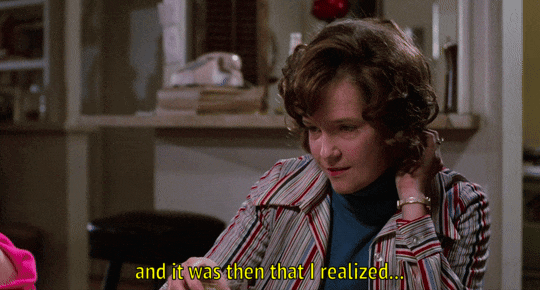

It's so sad because you can see the emotions shift so suddenly in her! That first gif still holds such affection as she recalls their first kiss. It's like she's a girl again, feeling that overwhelming sense of love and all the possibilities for their life together. But then it changes. She's brought back to reality and all the unhappiness, the disappointments, the realization that life isn't what she imagined for herself.
By the last gif, she's a woman who clearly feels trapped. Now stuck with this guy for the rest of her life. And what makes it so awful is that you can TELL Lorraine still loves him. She longs for that happiness they once had, but it takes two people putting in effort to make a marriage work. She can try to reach George all she wants, but if he can't be emotionally present, it isn't going to work.
Also, I'm sure that George loves Lorraine as well, but he's got a whole plethora of issues that just. Haven't been addressed. George has no self-worth. He's meek and lets people walk all over him and is so completely anxious about everything in life that he's mostly shut down. He's trapped too, with no way (that he can see) to change things. So he does what he can to survive, which consists of doing Biff's bidding and retreating to an inner world at the expense of shutting his family out.
I don't think things were always to this extreme, though. For a while I'm sure things were okay, maybe even good. They were young and in love, and while George was still George, I don't think life had defeated him yet. They got married, really established their little life together, and I can see them as both having hope. And even if there were moments that seemed shaky or hinted that things might be difficult down the road, it was easy to brush it aside. They were still finding their footing, and they were young and had their whole future together to make things better. In all honesty, Dave probably got to experience the "best" versions of his parents for the first several years of his life.
However, each year and every hardship (big and small) likely chipped away at the McFlys and brought about additional dysfunction. I don't know if Biff and George started working with each other right out of high school or if they came to work those jobs later on, but I'm sure that was a huge factor. It offered no escape from Biff for either George or Lorraine. Just a predictable cycle of George having to do whatever Biff told him, Biff invading their home whenever he pleased, and everyone having to watch George immediately tuck his tail between his legs.
As I said, I think things gradually kind of unraveled in their house. As the state of their family became more solidified, Lorraine likely began drinking more and withdrawing. I do think they still had their good days, though! Moments that brought them together and where they felt that happiness they once shared (I mean, they had three children together, and it's clear Dave, Linda, and Marty ARE loved and were raised well.) But the state of the McFly household is probably all Marty has known for the majority of his life. I can see situations arising where maybe Dave has told him, "They weren't always like this, you know."
Dysfunctional as they are, George and Lorraine really are trying. I think they can absolutely see the cracks and the flaws—perhaps even the potential damage being caused to their children—but they just have too much brokeness inside themselves to do better. So, they do what they can, which for George involves trying to protect his children's feelings by discouraging them from taking risks. He doesn't want them hurt or sad or disappointed, and his solution is to have them form shells around themselves. Better to save yourself from all the headaches life brings.
Lorraine does her best to protect and guide her kids by way of warning them away from the very things that brought her to where she is in life. We see this manifest in the form of criticism mostly when she's talking to Marty.
Lastly even with Lorraine seeming as downtrodden as she is, I can see her clinging to the possibility of change. Hoping and praying that eventually, George would say enough was enough and stand up for himself. He'd put his foot down, step up as a husband and father, and things would become what she always wanted. She was the one always telling herself, "Someday. Someday..." until the point we see her at during the dinner scene, where she knows that "someday" isn't going to ever happen. Things are just the way they are, and she has to deal with it.
This was a lot, but I have a lot of feelings about the McFly family and how they operated in their day to day life. Especially the implications of the McFly sibs (Marty in particular!) being raised in such an emotionally disjointed environment. Ugh, those gifs of Lorraine make me so sad. The whole thing is sad.
Thanks for the ask, though! I want to write another Twin Pines McFly fic now.
#asks#back to the future#bttf#no but i could write a whole series of posts on Twin Pines McFlys#and how just that one short scene displays such a sad‚ tense home life#no cohesion. no true connection#checked out dad and depressed mom#& their oldest son who doesn't seem to have his footing in life‚ daughter who feels isolated & frustrated with a lack of social life#& youngest child who's anxious & so incredibly sensitive to rejection & feels directionless & has exactly one (1) stable adult in his life#growing up in that environment does things to you!!#and then Marty is thrown into a Better Timeline with very stable and well adjusted parents but he still was raised with the dysfunction!!#that's still part of him!!! how does he cope!!!!??#losing my mind eric stoltz was right about the ending!!!
43 notes
·
View notes
Text
Little things that improved my life 𝜗𝜚˚⋆


Accepting my sleep schedule. I'm a night owl; I focus at night, I'm calm at night, I'm motivated at night. For a long time, I tried to fight this since everyone always preaches getting up early, but since I started accepting my natural sleep schedule, I've been feeling a lot better and have become way more productive.
"drink more water". TEA. Tea is the secret here. I will be honest, I hate drinking water; it doesn't matter if I have a cute water bottle or a cute glass, I still hate it. TEA.
Replying quickly. I used to be one of those people who get a text message and think, "Oh, I'll reply to that later", and then just forget about it entirely. Now, I text back as soon as I see the message. This has not only improved my texting anxiety (which I cause on my own by now replying and then feeling bad) but also deepened my connection to my friends. <3
Keeping my circle small and being okay with that. Over the past months, I've had this sudden urge to expand my social circle and get to know more and more people, especially after I moved in August. However, this quickly ended in what I like to call my "social burnout". I was tired, annoyed, and overwhelmed. It took a few weeks for it to settle, but I've come to the conclusion that I would much rather have a smaller circle of people who I trust and love deeply than a huge group of friends, and that's totally okay.
Wearing what I like. Even though I live in a big city, I'd still say that my style can sometimes be a bit more extravagant than what most people wear, another point is that I'm very uncomfortable with pants so I only wear skirts, which is also considered a bit odd where I live. But over the past years, I've come to accept that and have become so sure of myself and found such comfort in my style that I now just wear whatever I like, and it makes every day a little bit nicer.
Reading and writing for pleasure. Reading books outside of my studies and spending time researching topics that simply interest me is such a great way to calm your mind. Same for writing, I always like to say that to write is to think; putting your thoughts on paper in cohesive and well-crafted sentences that you can then reread and think over again is such a liberating thing to do.
Reaching out more. fuck the whole "double texting" and "no contact" thing. If you want to speak to someone because they mean something to you, then just do it. Unless they specifically asked for space, you shouldn't feel bad about wanting to be in touch with them. Many even really appreciate it when you show that you truly care. Let's stop the nonchalant act, and instead, let's face deep emotions and true vulnerability. <3
As always, please feel free to share your own little insights and things that helped you improve comments! <3
my insta: @ malusokay
love ya ・:*₊‧✩
#malusokay#girl blogger#it girl#pink blog#that girl#coquette#aesthetic#dream girl#pink pilates princess#glow up journey#glow up#mental health#self esteem#self love#self care#self improvement#loa blog#gaslight gatekeep girlblog#girlblogging#this is a girlblog#girlblog aesthetic#gaslight gatekeep girlboss#winter arc#dollete aesthetic#girly tumblr#just girly thoughts#girly stuff#studyspo#studyblr#study blog
4K notes
·
View notes
Text
*writes 9 and a bit pages in one evening on the simple question of why I use the name Tengri* wow that brings up the great question of my position on the advaita-dvaita duality and how exactly I see my Lord, the intersection of him as a part of nature and reality vs his manifestations as a person, and vice versa with his existence as a person and then connection into reality! Surely that will be a really quick discussion
#bro you wrote 9 pages on a simple question theres no way that will be any less than. like. 20 pages. actually you never know#actually no theres no way to explain it without explaining a tonne of shit fdjkghgfhdjk ok no#i love though that like. my entire catalogue of work w my ex (spirit guide) was him like ''we are becoming gods... our duty is to ascend...#but i cant explain it to you or even what a god is...'' meanwhile Leviathan is like ''yeah no youre not built to do anything other than#either choose to be your true self or not or interact with creation and (insert myriad of other things that dont involve people being#born Bad and Descended and Wrong) but anyway here let me tell you what I think a god is and let me show you what it means#to be connected to things like nature andhow to connect yourself'' like damn infinitely better teacher thanks#NOT forgetting sweet hermes and his opinions on godhood and stuff that was ALSO severely enlightening in the ''oh i get things now''#way not the ''im a god now woohoo'' way#ramblings //#However. I cant sit here writing about being a sky spirit and how that is a completely inhuman experience and how he is#both a being that appears to me in various forms and also ineffable almost-unidentifiable forces within it#and the sky itself and the deep ocean and the rain and the symbol of the sun and the idea of polar opposites and cohesion in bird flocks#and and and
1 note
·
View note
Text
Whenever Derek (true alpha always) goes to different packs for pack business (gathering information, building connections, or checking in), he always takes Stiles for many reasons.
Who cares the most? Stiles
Who can be surprisingly diplomatic? Stiles
Who does all the talking? Stiles
Who is bossy? Stiles
Who gets shit done? Stiles
Who supports Derek? Stiles
Stiles cares so much, that he feels the need to always go with Derek (for alone time 😏 or because he doesn’t trust Derek to share all the information to the pack).
Derek shows his support to Stiles, listens carefully to everything said, will add comments when necessary, watch Stiles with wonder and love in his eyes. Derek wants Stiles to go because his beautiful mate and him work so cohesively together. Where one lacks the other excels. Like yin and yang.
The poor puppies mope without their pack mom and pack dad there to care for them but they do enjoy some peace and quiet from time to time.
#sterek#derek hale#derek x stiles#stiles stilinski#teen wolf#pack mom stiles#pack dad Derek#soulmates#stiles x derek
1K notes
·
View notes
Text
You know. Sometimes you look back at decisions made by entirely separate creators and it's like, fuck, with a more cohesive creative vision to connect these things together this could have been fire.
Like. Hear me out.
Thor 1 writes Loki as internally racist against the Jotuns. Upon discovering that he's a Jotun child taken as a spoil of war by Odin and then deciding that means he could never truly be worthy in Odin's eyes, Loki goes off. He creates an elaborate plan to give himself casus belli for complete unadulterated genocide against the Jotuns.
He's not trying to steal Odin's throne; He already has it. He even saves Odin's life as part of the plan, when it'd be so easy to let Odin die and then I guess Loki's king forever. Rather, he's trying to prove himself a Real True Son of Asgard by wiping Asgard's rival off the face of the map forever.
The Avengers writes Loki as a shameless fascist who thinks commonfolk exist purely to kneel to a strongman dictator, and that the natural state of people is to be ruled by their betters. The movie directly, on purpose compares his belief system to the fascist rhetoric of Nazi Germany so it can act like its take on Loki is deep.
Thor: Ragnarok says outright that Asgard is a colonizer state that became what it is through bloody conquest and subjugation. It asserts that any claim the nation may have to being this noble virtuous protector nation is just imperialist propaganda by an old fascist who ran out of enemies to subjugate and started to reconsider how he wanted history to remember him.
So. Like. Okay.
Loki is convinced that his ethnicity makes him unfit for Asgard and intends to commit a genocide against his own people to prove himself a Real True Son of Asgard.
Loki's belief system is directly called out as fascistic and reminiscent of Nazi Germany.
Asgard was secretly an imperialist colonizer state built on the bones of the subjugated, conquered, and enslaved this whole time.
...what a fantastic one-two-three punch this could have made if anyone involved in making any step of this process had been writing their film with the other two in mind.
There is a fantastic switch buried in these three films where it seems like Loki has a perverted idea of Asgard and then it turns out, no, actually, he really was behaving in the spirit of the culture that shaped him all along. Loki was the Real True Son of Asgard the whole time, and that was the problem.
277 notes
·
View notes
Text
okay. here it is.
why john kramer (and lawrence gordon) are kind of classist
disclaimer: this contains some canon-based assumptions? nothing crazy. just know some of my points are “most likely this happened because this.”
this also contains bits from scripts. i really like gordon as a character i just like to pick apart guys with my brain
starting off strong with the fact that. most likely. lawrence gordon and john kramer were born into well-off families. that’s not to say they had the most perfect, 100% best lives, but i really doubt they struggled financially in a severe way. they both went to college for respectable degrees, and got respectable jobs where they feel that they are helping out society due to the goodwill of their own heart. the important thing to note is that they have most likely not experienced severe poverty or homelessness or living from check to check.
lawrence is very clearly over it when adam talks about how he does what he does because he needs to eat - and it’s no coincidence that adam was put opposite to lawrence in the game, because it was always lawrence’s game, and adam is someone that - despite the connection they gain - lawrence could feasibly bring himself to shoot and kill. he’s a ‘bottom feeder.’ he has no respectable job, he does shit they don’t approve of to survive. he’s the lowest rung of society and therefore it’s not a huge loss if he dies in that bathroom. not sure if that’s cohesive at all but it’s there in my mind.
in short: both lawrence and john (john’s the one who put him in lawrence’s game, after all) have very little respect for adam and his life solely because he’s on what they deem the bottom level of society. in poverty, committing illegal acts, and - ruining the lives of these better men.
when lawrence is crying near the end of the movie, he laments about having his “whole life in order” and wondering where it went wrong. he doesn’t come to the conclusion that the fact that he cheated on his wife is partially what made it all go south. he won’t even admit to it. and, yes, while the question of if he did actually physically cheat is up for debate - let’s be honest. that marriage was dying and it wasn’t allison’s fault.
if anything, at the very least, in that moment - lawrence feels that it’s adam and tapp’s fault for bringing all his dirty laundry to the top. it’s easy for him to pin the blame on them.
the most important piece of my argument is this part of the saw vii script, though. because it really hammers it in how the philosophy works. this is how john completely recruits lawrence.

the “underbelly of society has been indulged. they’ve begun to control the lives of the strong.”
the underbelly of society: addicts, sex workers. homeless people. impoverished people. a majority of the people who get trapped.
while you can come to me and say “john kramer traps rich guys too!” he does. that is true. but he also has a deleted trap where a homeless guy has to sift through shards of glass. trapped for being homeless is the most insensible thing i have heard of. he sucks.
the strong: important, respectable rich men like john and lawrence.
and that sentiment gets lawrence on board. he hears that and hes like “yeah these people deserve to be horrifically maimed.”
which is also what these tags said on my last post -
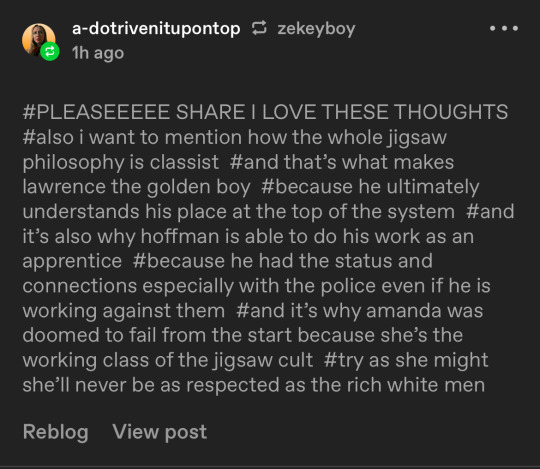
thank you to @a-dotrivenitupontop
the majority of the people behind john’s cause are these rich white men. amanda is an outlier - mostly because she’s more like a trophy for john, in a way. that’s a whole other post though
i didnt organize my thoughts here at all. idk if this is coherent. i couldn’t tell you. i just woke up. thanks guys
#saw#saw 2004#lawrence gordon#john kramer#jigsaw#saw 7#saw 3d#saw the final chapter#sawposting#idk man. im tired
81 notes
·
View notes
Text
The Sound of Music: How the Hellaverse Doesn’t Get Musicals
Despite two generations being raised on the concepts of musical theatre through the Disney Renaissance, it's only in recent times with Disney’s failure to replicate their own formula that people have been compelled to ask why. Why do some musicals work and others don’t? It’s easy to find someone on YouTube talking about musicals and discussing the “I want”/“I am” song without really understanding what that means for the musical as an overall structure. In order to adequately grasp the importance of understanding how singing works in musicals, one must start at the beginning: Opera.
Like musicals, Opera is also broadly separated into two types of songs: Aria and Recitative. Recitative is the part of opera left behind. During the evolution of musical theatre, the operetta adapted recitative into dialogue, breaking apart the songs throughout the story and leaving only the Aria behind. Aria in opera is what are the large musical numbers that are best remembered. The entire story comes to a crawl as a character stands center stage, looks to the back wall, and starts to sing. The Aria was how theatre go-ers would learn about the characters, their motives, and desires. The recitative was often performed like a sing-song narration that could be more or less musical, but the true depth of the story was found in the Aria.
The reason why the story worked was the structural cohesion of getting to know your character in one grand, memorable way and checking in with them as the narration went along. You would see how they changed based on the songs and their progressions. You’d understand why things would change as the songs were coordinated with dramatic events littered throughout the plot. Something would happen followed by a character singing how that thing affected them. This basic structure inherited from Opera is still the structure of Musical Theatre. The Aria further deconstructed into the “I Am” and “I Want” songs. These songs as a basis help offer a deeper connection between the audience and the characters while also adding a sensation of progression with how the songs interplay between the narrative and world.
With the transition to our modern musical theater, we have tightened up the formula of integrating musical numbers and the pacing of traditional theater. Singing should never result in a stagnation of the story. We should constantly be learning something about the characters, story, or world at all times. Music works best when paired with profound moments in the story. The more emotionally heightened a scene or plot point, the more effective it is to express it in a song.
These are just the broad, unrefined general guides to how musicals work, but I believe these are substantial enough to grasp what makes a “good” musical and what is lacking when someone says a musical is “bad”.
On the surface Happy Day in Hell appears to be a classic “I want” song, heavily inspired by Howard Ashman’s Belle. My argument for this comparison being that Happy Day in Hell touches on all superficially similar points as Belle from the unnamed background chorus, Vaggie following Charlie by jumping along the rooftops similarly to Gaston, and the overall subjects the song incorporates such as the emphasis on setting. My points are focused on the superficial and take in account that the context are not identical, but the purpose was meant to be an imitation in some manner. Whether its a homage to Beauty and the Beast or merely a clumsy ripoff, Hazbin Hotel is very obviously copying notes. Which is why it's easy to identify why this song just doesn’t work.
I will preface this portion by recommending Calxiyn Cares Too Much’s video on Happy Day in Hell. She makes similar points to me and, while we do disagree on some points, overall she has more ethos than I do, being a musical theater performer. She is generally more lenient on the music and story than I am while providing more in depth technical critique in terms of rhyming conventions and lyrical pacing. But while I don’t agree with everything she has to say, I do think her video is worth a listen.
To come out and say it, Happy Day in Hell is a disaster of an “I Want” song due to a lack of coherent wants and this is the result of not knowing how writing and stories work. Even divorced from the structure of a musical, the entire message of the song is fundamentally confused and this is in part a failure of understanding narrative structure and misunderstanding what was going on in Belle.
In Disney’s 1991 animated film, Howard Ashman started the story with a magnificent musical number, masterfully weaving in the setting with the desires of the titular character and her conflict with the rest of the world. She is an outsider, both in her own perspective and that of the town. We see her disinterest in them with her line “There’s the Baker with his tray like always with the same old breads and rolls to sell”, layering the delivery with a hint of melancholy and perhaps even a hint of condescension. The lack of variety in her life is a source of resentment to her, not in that fiery passionate sense, but the frustrated impotence that comes with craving experiences over stability. She isn’t a cruel or rude person, but her attitude towards them is that of how someone would regard an NPC.
This is most clearly seen when she attempts to engage the baker in conversation about her book and he waves her off. The little eye-roll and smile as if to say, “Of course” with a shrug of her shoulders. It’s the purest display of condescension without malice. The movie has comparisons of the Townspeople to Sheep, first having Belle interact with sheep instead of the town before depicting the town as its own kind of herd to later outright having The Mob Song with the lyrics “We don't like/ What we don't understand/ In fact it scares us”. The subliminal messaging of their “sheep mentality” is intentional and multifaceted, not just positioning Belle above them by simply setting her apart but confirming that her perceived superiority should be seen as the truth. Belle is a better person than anyone else in town, she is special, that isn’t being challenged.
This is called world building. Belle’s singing is not just telling us about the town, but her feelings about the town and the town’s relationship to her. It foreshadows the finale and sets all the tracks down to move the story along. Belle wants fantasy and adventure, she doesn’t care that she doesn’t fit in whereas the Town’s musings of her shows that her not conforming is disruptive to them. This additionally explains why Gaston and his quest to marry Belle is so supported by the town at the end of the film. Why would they completely go along with imprisoning her father in the asylum unless Belle agreed to marry Gaston.
The opening number made that kind of escalation so natural to where it makes little sense to question motivations of anyone involved in the story. We have a thorough and intricate roadmap of conflicting wants and needs from three major characters in the cast all through the subliminal use of language and themes. So when Belle is literally singing about the town what she is actually conveying are her motivations for her want. “I want so much more than this provincial life.” The character embodying that provincial life is the Town. The Town is what Belle wants to run away from. Gaston is the force trying to keep Belle from leaving the town and pressure her into something that better adheres to the values of the town.
This song is the thesis of Beauty and the Beast.
Similarly, Happy Day in Hell is the thesis of Hazbin Hotel. But what exactly is that thesis? This is where the wheels fall off the cart. Happy Day in Hell doesn’t set the stage for Charlie’s desires and motivations, but rather loses focus and meaning the second Charlie leaves the hotel.
The straightforward response is that Charlie wants to convince Heaven of something to motivate them to do something about her Hotel.
It is unclear what she expects Heaven to do, let alone what she is going to do to get that outcome. In just discussing this question I have been told what Charlie wants is anything from “Convince Heaven to redeem sinners” (like she appears to be doing in Welcome to Heaven) to “Convince them to stop the genocide” (which seems to make more sense in regards to Adam and Lute), however neither of these aspects actually address the main issue of the song number: Sinners don’t believe in Charlie and her hotel.
This issue is also why the actual structure of the episode is just wrong: the B plot has nothing to do with the A plot. While it isn’t always necessary for that to be the case, it actually holds a story together better when they do overlap. In Rick and Morty season 3 episode titled “Pickle Rick”, the family attends therapy and Rick turns himself into a pickle to get out of it. Beth takes the syringe full of an antidote Rick was going to use to turn back into a human after the family left, showing how she doesn’t trust Rick not to abandon her. Beth’s B plot of attending therapy with the kids thus ties directly back to her fears of abandonment and distrust that kicked off the episode in the first place while juxtaposed with Rick’s A plot that, on the surface, has absolutely nothing to do with therapy. However, Rick entering a top secret base is metaphorical to him infiltrating Beth’s emotional fortress. He never asked to be there, and for all intents and purposes he doesn’t want to be.
As Beth locks down her emotions on Dr. Wang, the facility responds similarly. Even more, it is a father who is sent to kill Rick in order to protect his daughter. A plot point that becomes an even deeper parallel in the season five finale where it is revealed that Rick’s tragic backstory of his Beth being killed in an explosion alongside his wife from season 3 was actually true. So Jaguar having refused to work for the Russians and losing his daughter in the process is a direct and intentional parallel of their motivations. The hardships Rick faces throughout the episode from rebuilding his body to destroying a secret Russian spy base are thematically relevant to the B plot of attending family therapy. This episode also places Beth and Rick in a position to have their relationship evolve through “Froopyland”.
”Pickle Rick” was emotionally and thematically necessary in moving the characters to a place where they could change. And that was masterfully rafted through parallels between the A and B plots. So when it comes back to structuring “Happy Day in Hell”, it makes no sense for Charlie’s plot to focus on convincing Heaven to do anything. It makes more sense for her to be trying to convince Sinners to come to her hotel and attempt redemption. If she is trying to convince Heaven to redeem sinners, she should have sinners who she thinks are ready to be redeemed. If she is seeking a ceasefire from the exterminators, then she should have a hotel with more than one resident to show that there is a desire for redemption within Hell. If anything, the song reaffirms that Charlie’s plight is pointless.
Because of this confusion and lack of focus, Happy Day in Hell is a weak thesis for Hazbin Hotel. It apes on structures it doesn’t understand, telling a story it hasn’t earned, and fails to thematically connect the two plots of the episode despite having both leads in Vaggie and Charlie singing together. Structurally, the song foreshadows the fumbling of the rest of the series’ major plot and world building. It lacks an understanding of why musicals are the way they are and fails on even a surface level to comprehend the important role of musical diagesis And its inherent limitations in storytelling on top of failing to structure the music thematically to the character motivations and overarching plot.
Visual Storytelling is an intricate circus of multiple mediums coordinating together in a delicate balance that can corrupt the entire production by just one mistake in the visuals, pacing, writing, or music. All of these categories have their own completely unique set of rules that only become more complicated when trying to be used in tandem. And to have a director not understand the fundamentals of ¾ of those categories results in a sloppy cacophony of poor choices.
#vivziepop critical#helluva boss critical#helluva boss criticism#hazbin hotel critical#vivziepop criticism#helluva boss critique#spindlehorse critical#vivienne medrano#vivziepop#hazbin criticism#hazbin critical#hazbin hotel criticism#hazbin hotel critique
84 notes
·
View notes
Text
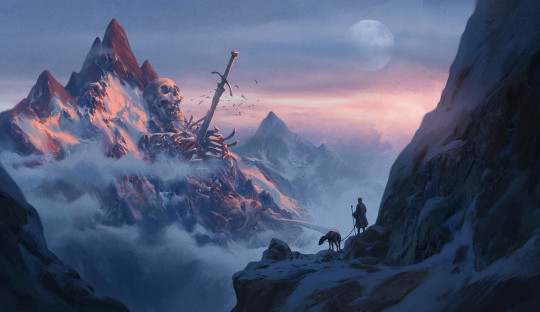
DM Tip: Creating a Campaign Skeleton
Learning to be a better dungeonmaster was a protracted process. A younger me was often so stressed out by the desire to be a better artist that I'd have legitimately mauled a person if it would've revealed to me the wisdom I sought (with my hands or even an actual maul given the chance).
One of my biggest hurdles was the idea of a universal framework for d&d adventures, a guideline that would tell me if the things I was creating were on the right track. It was sorely needed, I loved the process of being creative but without an understanding of how my creative energy was best used I ended up sinking days, weeks, or even months worth of energy into projects that went nowhere. Worse yet, when I DID get a chance to put my ideas into practice at the table they'd frequently spiral out of control and crash, resulting in even more stress.
Over time I learned from these mistakes, I got better, and then I got good. I moved from conscious incompetence to competence, and I ended up having a run of absolutely stellar campaigns that were everything my younger self could have dreamed of: stable, enjoyable, meaningful, and most importantly an absolute delight to my players. Routinely I'd have people, including folks that'd only played with me a few times, mention that getting together to roll dice and listen to me babel on in silly voices was a highlight of their week.
It was as one of these campaigns began to wind down (three years! a satisfying conclusion on the horizon!) and I started looking for a followup scenario that I decided to study all my really successful campaigns and figure out what connected them. The end result was something I'd been looking for for nearly a decade, a reliable format that I could build campaigns around.
I want to preface this section with the understanding that while this information is laid out in a vaguely chronological fashion there's no guarantee that these ideas will occur to you in any particular order. Inspiration is a funny thing, and each idea flows into the others to make a cohesive whole. Due to foreshadowing and setup reasons you're also going to need a pretty solid idea about all of these when starting a campaign, though exact details will likely change/ can be vague up until the moment they're needed.
The Reason: Who are we and what are we doing?
Gives your players a solid background to build their characters around and give them a reason to travel together, rather than having to ad lib one on the spot. Likewise sets expectations of what the campaign is "about" that you can build on or subvert in time. The reason doesn't need to hold true for the entire game, just long enough to serve as a framing device. EG: The Witcher starts out as a "monster of the week" setup and then uses that framework to pivot into politics and prophecy once we've seen the premise play out.
The Pilot/Crashtest Adventure: What's first?
I’ve already written about these, but the general concept is to give your party a mostly contained first outing that doesn’t have any larger bearing on the plot so they can focus on learning how their characters play/building the party dynamic. By the time the party's finished this first adventure they'll have already started putting down roots in the world: they'll have in jokes, npcs they've started to care about, an understanding of what's on the horizon, and an idea of where they want to go next.
The Central Gameplay Pillar: How does this all work?
It's important to have an idea what your campaign is going to be about in a mechanical sense in addition to its plot and themes. There is a difference between an adventure that has the party delve a dungeon, and a dungeoncrawling focused campaign. I like to lead with these outright during the campaign pitch so that players can know what they're getting into. Your playgroup will likely have strong opinions about what they like and dislike, even if they don't have the words to describe it, so you might need to explain the ideas for them.
The Hub: Where are we?
I think every good campaign has a hub, some kind of settlement that the party returns to between adventures to offload loot, pick up supplies, and sift through the latest gossip to look for the next questhook. Letting the party return to the same place lets them build up a relationship with it, clarifying the picture in their mind as new details are added and they grow more and more attached. It's possible to have multiple hubs over the course of a campaign, but I'd advise really only having one per arc to best concentrate your efforts. Fill up your hub with distractions and side adventures, shorter stories that the party can get tangled up in while the larger adventure slowly reveals itself. Returning to the same hub also means returning to a familiar and expanding cast of NPCs, which helps your party become more and more invested in the setting
The Main Event: What's going to happen?
Here we get to the meat of the issue, the big story you want to be telling using this campaign. To pull off the sick narrative kickflip you wish to perform, you're going to need to lay a lot of groundwork, seeding in details left and right as well as giving the party a chance to stumble across evidence of your schemes without ever realizing the whole thing. To do this, you're going to work in the building blocks of your big reveal/twist/pending disaster into the setting along with those side adventures from the hub. This will give your party an idea that something is going on, but with more pressing matters to take care of they're going to be distracted up until the moment you decide to pull the trigger.
The Setting: What's over there?
While things like genre and tone are definitely things you should have a handle on from the outset, I personally feel like the details of a setting are best constructed on an ad hoc basis, either in a direct response to something required by part of the narrative (be it side story or main event), or pencilled in at the margins as the party explores the world.. That said, creation of the hub and setting often go hand in hand because it's important to match the settlement to the environment and then shape the environment to the quests inside the settlement. As for what's beyond your hub, I happen to have just written something about building out settings.
Now, this next option is one that I recommend you start thinking about only once your campaign is fully underway, so it doesn't clog up your creative process by focusing on something that you might not even get to
The Change: What the fuck?
A little while after the main event has kicked off and your party is off on the quest that will turn them from mere adventurers into heroes, they start to hear rumours of strange happenings. It's certainly not related to the present scenario, it may even be an unexpected windfall, but it's not something they have time to look into. Time ticks on, the land is saved, and the party is able to enjoy their victory lap as well as some dearly needed time off. Before they can get comfortable however they're slammed by some strange occurrence that they could have never predicted that changes the state of the world. A neighbouring kingdom invades, an important ally is murdered and they're blamed for it, a dragon starts rampaging through the realm. Its important that this event is outside the party's skillset, not necessarily diametrically opposed, but counter to what they were planning
artsource
351 notes
·
View notes
Text
How to Build a High-Value Personal Brand for 2025


Join my 3-hour live workshop on Zoom, where we will create a tailored luxe glow-up plan personalized for you for 2025. Seats are limited and are first come, first served. Click here for more info.
A high-value personal brand speaks for itself and doesn’t need constant validation. To craft this kind of brand, you need intention, strategy, and most importantly, confidence.
Start by defining your unique value proposition. To build a standout personal brand, it’s crucial to understand what makes you different. Think about what you offer that others can’t. Your brand should be rooted in authenticity—clarifying what you’re known for, whether it’s expertise, passions, or core values. This isn’t about being everything to everyone; it’s about being clear on what you bring to the table.
A consistent visual identity is key to elevating your brand. Your aesthetic must align with the image you want to project, whether through social media, a website, or content. Everything should reflect a polished, professional image that exudes sophistication and exclusivity. A consistent color palette, style, and tone in your visuals will reinforce your brand’s message, ensuring it feels cohesive and high-end.
Your online presence is your first impression, so it needs to be impeccable. High-value women don’t indulge in oversharing or negativity. They create and post content thoughtfully, aligning it with their values and showcasing their lifestyle, expertise, and mission. Each post or interaction should reflect your tone—confident, poised, and purposeful. Engage with others in a way that shows you value their attention but also maintain an air of exclusivity.
Your voice must be unmistakable. The most powerful personal brands have a signature style of communication. Whether you’re writing, speaking, or engaging in casual conversation, your tone should radiate authority and confidence. People should know exactly what to expect from you and be drawn to your unique way of expressing yourself. Whether it’s your writing style, speech patterns, or even how you present yourself in person, everything should reflect the strength of your personal brand.
Networking is an essential part of building a high-value personal brand. Cultivate relationships with people who align with your vision and can help elevate you to the next level. Don’t waste time networking for the sake of it—focus on building meaningful, mutually beneficial connections. Surround yourself with individuals who respect and support your growth, and who can open doors that might otherwise remain closed.
Staying true to your core values is non-negotiable. Your personal brand should be grounded in principles that guide every decision you make. Whether it’s integrity, self-respect, or authenticity, your values should remain unwavering. A high-value brand is built on consistency and trust, which means never compromising your standards to chase approval or popularity.
Make sure you’re seen and heard in the right places. Position yourself where your ideal peers are. Don’t try to fit into spaces that don’t resonate with your new brand or that dilute your value. You need to ensure your presence is visible in circles that align with your mission and values.
Finally, invest in yourself. Your personal brand is a reflection of your commitment to growth. Continuously improving your skills, upgrading your wardrobe, or even seeking coaching will all contribute to your personal brand’s evolution. The most powerful personal brands are built by women who are always leveling up and never stagnating. When you invest in yourself, your brand reflects that growth and continues to attract more opportunities.
A high-value personal brand isn’t about pretending to be someone you’re not. It’s about embodying who you truly are and aligning every part of your presence with that authentic essence. When you consistently show up as your best self and project your worth unapologetically, opportunities will flow your way.
Join my 3-hour live workshop on Zoom, where we will create a tailored luxe glow-up plan personalized for you for 2025. Seats are limited and are first come, first served. Click here for more info.
#q/a#leveling up#that girl#level up#self care#level up journey#personal development#femininity#hypergamy#leveling up journey#dream girl journey#femininity journey#glow up journey#glow up tips#glow up#leveling up tips#level up tips#femininity tips#self care tips#self healing#self development#self growth#self help#self improvement#high value woman#leveled up woman#girl blogger#girl blogging#girl blog#girlblogging
61 notes
·
View notes
Note
i'm working on my own concept for my own mlp fanlore/au and i've been inspired by your take on alicorns to make my own more unique as well. my idea is centric around the concept that alicorns are ponies who acended into what's basically pony elves that get worshiped because of the mysterious way they ascended, but idk how to really make a religion set up that works cohesively with it. i am wondering if you possibly might have some tips and tricks for how to go about my alicorn religions.
The most important thing about religion is that it's made up. If it is based in observable fact, then it's not religion; it's just culture.
Paying taxes and bowing to the king is based on observable orders. Believing that the king has a divine right to be king, or that he has powers/blessings granted to him by birth/status is religion.
In skyscraper gods, things are different because believing something about a god actually has the power to make it true, or at least influence the god's form/powers in an abstract way. My gods are influenced/given power by belief and worship.
In the human world, you can believe whatever you want about any person or god, and that doesn't make it real. If there are gods about, they are unlikely to be controlled by human religion, and definitely aren't spawned by such (or we would have a lot more gods than we do)
In a normal world, religion is not based on observable fact, and it is designed and maintained by the people themselves.
So from my limited understanding of world religions, there are four "needs" that religion is designed to fill: Community, Ritual, Meaning, and Ethics.
I went off the deep end and wrote an essay about my philosophy. Whoops, hope you enjoy:
Community
Humans need community, and many religions involve gathering and doing activities together. This makes religion incredibly important to human social health, as we often fail to fill our need for community because we don't immediately die without it. Under capitalism especially, we are incentivized to ignore as many human needs as possible in order to be productive/survive. Religion makes itself more important than simple survival, and ensures we fill certain needs by promising metaphysical rewards.
Ritual
Ritual is also incredibly important to human health. We thrive when we have a consistent schedule to the day, month, season, and year. It helps us save our brain bandwidth if we already know what basic tasks will happen today. Instead of doing math to figure out optimum times to do so, we socialize, come of age, physically touch, meditate, sing, mourn, plant crops, travel, cook, keep records, hunt, celebrate, and more according to a calendar maintained by religion. These are all important aspects of life that we need to remember to fill, either by logic, community, or religion. Science even backs up the need for ritual, with brain pathways growing best in response to consistent habit-keeping. But brains aren't observable for most people, so we have culture and religion to keep time instead.
Meaning
Meaning is a tricky one. We ended up with brains big enough to wonder why we exist; a burden few animals share. Scientifically, we thrive in environments/jobs/roles where we feel that what we are doing has value. I look at every part of my life and see the value of being a person, observing and changing my environment. Many people on earth aren't sure that's enough, so they invent an unobservable force that assigns value to their lives and actions. Meaning is easiest to keep track of and believe if others share your definition. Culturally, you have a lot in common with your neighbors, you both probably work toward similar goals (housing, stability, connection with others, secular holidays) and are satisfied when those goals are met. Religiously, you have a lot in common with others in your religion (charity, proselytizing, meditation, celebration) and are satisfied when those goals are met. Religion also provides goals for your entire life and community which are helpfully defined for you, whereas you have to come up with that on your own outside of religion. Doing so can be frightening, frustrating, and difficult, so religion is very rewarding and calming.
Ethics
Lastly, there's Ethics. Not all religion deals with ethics, but many major earth faiths do. Humans desperately need to have a code of ethics to be healthy, and society works best when we all agree on some basics. That way when someone violates a law, you don't have to convince everyone around you that what they did was wrong; there's already a standing defined agreement. Ethics is about rewards as well as punishment. For example if you're the first one to read this whole thing I'll draw a pony for you just dm me. Community ethics are decided by those in power, and "those in power" can be: the people themselves via majority rule, chosen representatives, rich aristocracy, respected philosophers, religious appointees, kings and conquerors, holy mystics, sacred texts, etc etc.
Religion comes in with a code of ethics (written by the religiously powerful) and imposes it on its followers. This is useful and generally brings community harmony when they all agree on something. Religions based on ancient texts are tricky, because old, outdated ethics have to be reinterpreted to fit modern landscape. These interpretations split churches and create sub-religions, which mutate into cults, peter off into nothing, or go to war with each other. It's great fun. At the end of the day, having a group of people who agree on right and wrong within their community is the goal. We just got lost on the part that said everyone else in the world has to obey our ethics or else we're blowing up the planet.
...
Aaaanyway, this was about.... my little pony?
Does Religion Affect Gods?
The first thing you must choose is how much the religion is based on fact, and how much is made up. In my world, there's a lot of things that are made up by ponies, that either become true or influence the god's form/powers in some way. Luna used to be silver, but now she is dark blue.
You can do that, or you can be normal about things. Typically, religion does not actually do anything. Gods are gods whether or not they have worshipers. People believe things that gods tell them, and they make up their own lore as well.
What about People? What about this and that and everything?
You need to decide if your alicorns are participants in the religion about them, or just subjects. Do all/some/any of them take their place as religious figures and command the masses? Do they speak ethics? Do they inform ponies of the powers they have? Do ponies make up abilities they think alicorns have? Do they like being worshiped, or is it more like stalking?
Some alicorns may embrace godhood, while others flee from it. The ones that get the most involved will have influence over how the other alicorns are treated.
Is there a standard to which alicorns must live, failing which they can't be "real" alicorns in society's eyes and are thus shunned/killed? Do the alicorns ever give an opinion that is taken way out of proportion and suddenly became a major religious movement? Are marshmallows illegal because one alicorn doesn't like them? Do ponies get prosecuted for stepping on "sacred" flowers which are just regular lilies? Is there taxes/tithing to alicorns? Are alicorns promoted to political office for nothing except their nature?
How do ponies construct their sermons/temples/practices to fulfill the four tenants of religion? Does alicorn worship provide them with Community, Meaning, Ritual, and Ethics?
Do alicorns actually earn any of this? Are they regular guys that just look special? Can they abuse their powers? Can ponies abuse others in their name? Do the alicorns speak to the masses or to religious leaders? Do they have any control over their legacy or is it out of their hooves? Are they in danger of their worshipers deciding they need to be freed from their mortal bodies? Do religious leaders go power crazy and use alicorns to further their agenda? Are their schisms and wars over beliefs? do the alicorns command their followers to fight each other? Do they fight with each other? Does each alicorn have a different following or are they all part of a shared pantheon? Do they respect each others' role within that or struggle for change?
And remember, what is true for one alicorn/church/sect/country may not be true for another. Variety is the key.
It's all About the Questions
The trick to worldbuilding is to ask a lot of questions. You can answer them as you go, having the answers lead to more questions, or you can ask a bunch at once and answer them all later.
Every decision you make has consequences. Big social movements affect the environment, the environment affects food supply, food supply affects social movements. Everything is connected, and religion makes those connections more magical, for better or for worse.
108 notes
·
View notes
Text
I think Seven would tentatively confide in B'Elanna about dissociation problems and B'Elanna would be like "Seven, everyone deals with that kind of thing! Don't worry about it too much, okay?" and they'd both be like, quietly relieved that they're not the only one and thus think that it's normal when in reality they should both talk to like, a professional. AND THEY WON'T! Bc they both kind of know in their hearts that it's weird but it's ok, bc they found someone else who understands and won't try to analyze them about it <3 Seven Dissociation: Fragile sense of burgeoning identity. Goes between feeling 'too empty' (you're not supposed to be alone) and 'too crowded' - as if she can feel multiple identities within her. Feels as if the 'original' her has died and she is a completely different person than the pre-borg her, not as if she IS that child just grown up. At times of high stress, she sometimes has memory lapses which freak her out. Not connected much to her body. Is this body hers? Where did she come from? She was born when she was severed from the collective and she was born when she emerged from the maturation chamber and she was born at some distant point in the past beyond memory, to a Human woman she once called mother. At times she listens back to her personal logs and feels as if she's listening to someone else's thoughts and opinions. Sometimes she remembers saying these things but still feels this way. It reminds her of being Borg, where she can remember things she did but can't really...reach it. Can't empathize fully. Who is Seven? Is she that child, the Human? Is she Seven of Nine, the borg? No. No. Who is Seven? B'Elanna Dissociation: Has a very 'insecure'[?] sense of identity. Easily hurt by and conscious of what others think of her though most wouldn't think this is true. Long periods of feeling completely detached from her body and the world, though she's still going about her daily tasks. Looks into the mirror and doesn't really recognize herself or sees herself as revoltingly ugly in ways others don't see or understand. At times self-harms in an attempt to 'return to herself' if she's dissociating too long as it starts to scare her. Often goes back and erases personal logs made while she dissociating. As a child had an internal habit of blaming things on one 'half' of her, heavily demonizing "The Klingon" girl and this has persisted into adulthood. Views herself in a very 'split' way - "My Klingon side protected me from X" etc. Does not have a cohesive whole vision of herself but instead sees herself as essentially "Good Half" and "Evil Half". I can picture her saying it was like she had a twin sister growing up. This began further back than she can remember but solidified totally after her father abandoned her family. At times she feels she is the "good" version of her, berating the "bad" one and at other times she's the "bad" one being berated. Her body is ugly and she is half evil and if only she could get rid of it, disengage from it, escape herself totally....
#Seven#B/7#B'Elanna#Guy who Dissociates a lot and has identity issues: I think characters I like dissociate a lot and have identity issues#<- THIS APPLIES TO TUVOK TOO BUT THAT'S NOT FOR THIS POST. THIS POST IS FOR THE GALS!!!!!!!!#st voy#st voyager#star trek voyager#girl who was told that half of her was unloveable and monstrous and bad as a child x girl who was a child for like 6 years and that's it#Tuvok's thing has more to do with being Vulcan - like. it's weird to Humans but normal to Vulcans#Natural for the Vulcan mind v_v HOWEVER. HE KEEPS DOING DANGEROUS MELDS (consensual)!!!! & HAVING HIS MIND/BODY TAKEN OVER (nonconsensual)#and then also being ripped away from his wife and children v_v#For Seven the Borg thing is inexorably tied into her mental health issues#B'Elanna Torres
68 notes
·
View notes
Text
🥣 ᯓ★୭ ˚. ᵎᵎ
𝐌𝐎𝐎𝐍𝐋𝐈𝐆𝐇𝐓 𝐎𝐍 𝐓𝐇𝐄 𝐑𝐈𝐕𝐄𝐑!

⊹ ࣪ ˖ animator!welt x apprentice!reader
request ؛ ଓ @gonuclear do you think i could request welt yang with a reader that’s working as his apprentice (whether it’s a modern au or not is up to you! i don’t mind either way :) ) and he ends up starting to fall in love with them? maybe he even confesses 👀 up to you! thank you so much!! 💖
gia's notes ؛ ଓ haii thank u for requesting welt i loved writing for him!! unfortunately no confession because i am a sucker for pining 😔 it's also kinda short sorry
word count ؛ ଓ 0.8k ( + pining, fluff?? no warnings, kinda weird perspective changing cos its kinda from your pov at the start but from his later idk )

WELT'S A GOOD TEACHER. he's good at his craft, well-versed in tips and tricks and adequate enough to not only tell you about them, but ensure that you fully understand him too.
it's a pleasure to watch him work, too- a master at his craft, though he'd shake his head and chuckle in denial if you were to ever say it to his face. his face a perfect picture of concentration, velveteen voice narrating his actions as you watch on in awe as if he makes life itself sprout from the screen before him, as the sequence begins to take cohesive form.
it was that tiny screen that connected the two of you as well, two separate frames now working in tandem, many late nights spent trying to reach a deadline in time drawing the pair of you intangibly closer to each other.
so really, welt should have anticipated his feelings for you transitioning from a mild fondness to... something more profound.
it creeps up on him gradually, of course.
you're quite the talkative type, as opposing to the more reserved nature of welt. you can't help but share little tidbits about yourself, anecdotes about you and your friends, or little facts about yourself that welt surreptitiously makes a mental note of.
he can't help himself, either. he'll find that aspects of you bleed into his life away from work, too. even after he leaves the building so late, bidding you a good night that you cheerfully return, the next morning he'll be brushing his teeth, eyeing his weary reflection in the mirror, shuffling around his modest apartment until he catches something that brings his mind back to you, and he'll stop for a second to wonder just why he's thinking of you, his apprentice.
some point along the way, all the forced proximity with all of those late nights, you had ever so sneakily been promoted in his mind from an apprentice to something else altogether.
your eagerness, your determination- the passion with which you spoke and the way peals of laughter left you are not the first things that should be coming to mind when he thinks of you. the way you're like a breath of fresh air to him, how soft your hair looks, the bright shine in your eyes- no, welt mustn't think about it for too long.
and despite his reluctance to admit the true nature of his feelings- to break apart his forced ambivalence- your conniving self managed to sneak through anyway.
the realisation hits him one particular late night. it was just the two of you in his dingy office, though it was no deadline that caused the two of you to be the only ones left within the building. instead, it was a rather special occasion.
you had been making fine progress whilst being his apprentice, your own talent for animation beginning to really hone itself- to the point where he was confident in encouraging you to enter a competition.
and when the announcement of the winners rolled around (a date that he definitely had not written in his diary), he had the joy of seeing your beaming fave as you bounded into his office, telling him all about how you had won first place.
and then you had procured two containers of takeout from behind your back- saying how you wanted to say thank him for his guidance and celebrate with him, waving him off as he stammered out some flimsy excuse of not wanting to keep you here later than necessary.
nonsense, you had told him. besides, you liked spending time with him.
that sentiment had him sitting up straighter in his chair, allowing an indulgent smile before he half-heartedly schooled his expression into one of neutrality again. his heart was beating a little faster, he noticed, his silly physical response to you making him feel like a schoolboy with a crush.
but it's not until he opens the takeout box in front of him to see his favourite meal- you had asked himeko what it was to get it right- and your beaming face watching for his reaction, did it truly hit him.
he realised just how much he had fallen for you. how strong the fondness for you has taken root within him, how light his soul feels when he returns your smile with an approving nod of his own.
but for every reason he finds to love you, he can't help but continue to bite his tongue, to remain restrained and merely smile and nod along to what you say instead of offering more of himself to you.
maybe one day, he tells himself. the half-promise leaves a bitter taste on his tongue.
but it doesn't change the fact that as of right now, he's more than content just basking in your company, a mere planet orbiting the bright sun that you are, revelling in the brightness and warmth that comes with you.

IF YOU LIKED THIS, TRY ... because love can burn like a cigarette
hsr men as your high school crush
alternatively, you can find my hsr masterlist here! ୨ৎ
#୨୧ gia.txt :: welt#welt x reader fluff#hsr welt x reader#welt x reader#welt yang fluff#hsr welt fluff#welt fluff#welt yang x reader fluff#welt yang x reader#welt yang#hsr welt#hsr x reader#hsr x reader fluff#honkai star rail x reader#honkai star rail fluff#hsr welt yang x reader#hsr welt x reader fluff
98 notes
·
View notes
Note
I've been binging your comic and first of all, I gotta say this is a masterclass in plotting a story. The events feel so connected and cohesive! I've been hooked the whole time! Second, your character writing is insanely good. And so is your art and writing in general! Third, woah, Asphodelpaw. That left me devastated!!!! Fourth of all, I'm on issue 35 and here to make predictions!! I think Corm will survive, as well as Blacknose and the kits. Possibly Daff. Cypress might go either way, but Nightberry will kick it in a blaze of glory. Beeface will die, leaving Plumstripe to grieve her. Slugpelt won't make it, I don't think, unfortunately. Egrettail and Redpelt might go either way. I also think Cootstorm isn't gonna make it. It would be so ironic if she died trying to run away. Pinepaw will die, but might manage to fatally wound Deepdark in the process. How? No idea, but I've got a vibe. Rainhaze will die, but he'll kill Ranger before he goes out. Not to protect BarrenClan or anything, but 'for no reason at all'. He gets the chance, he takes it. In true Defiance manner. I'll go continue reading now, I'm so excited to see where this story goes! And also devastated. When the tragedy tragedies, how could this happen..
Thank you so much! I appreciate your kind words. How'd your predictions go after reading the rest of "The Death of BarrenClan"? Got any more for the future of the comic?
58 notes
·
View notes
Text
Every single minisode is Aziraphale's memory, and why that's [not?] important
There is extensive meta-analysis, my own included, that Before the Beginning is a doctored memory resulting from erasure of Angel!Crowley, and that the trace of him that is left in Aziraphale's memory is the Starmaker, so that this is what we see at the opening of S2. With this foundation of "some scenes are altered memories," we can critically examine the minisodes and see that, in fact, they are ALL Aziraphale's memories that are potentially subject to doctoring.
Evidence (and exploration) below the cut:
A Companion to Owls
The largest part (S2E2 22:10 to 44:00) Book of Job flashback is book-ended by Aziraphale leaning over the physical Book of Job in his bookshop. We enter the memory when Aziraphale enters it, we leave it when he leaves it. Pretty straightforward.
The Ressurrectionists
Similarly, in S2E3, we begin the first flashback to 1827 with Aziraphale's "dear diary" entry. We flash out each time to Aziraphale: in the car to Edinburgh, getting out of the car at the Ressurrectionist Pub, and with Aziraphale staring up at the statue of Gabriel while standing in the graveyard in Edinburgh, respectively for each of the three flashbacks. This all strongly indicates that we've been in his memory.
Nazi Zombie Flesheaters
I didn't even notice until I was doing research for this that basically the entire episode takes place in 1941. From the end of the main title at 5:00 to 37:50, we never come out of the 1941 story. But what is interesting is what bookends this minisode.
Before the main title, Shax has tricked her way into Aziraphale's car and alludes to a time when a rumor started about our ineffable husbands:
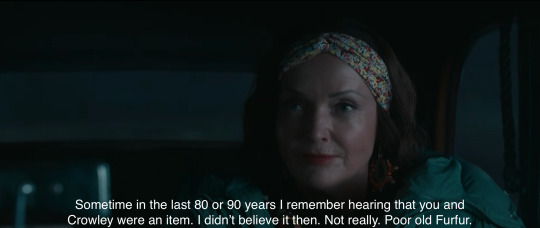
Sometime in the last 80 or 90 years I remember hearing that you and Crowley were an item. I didn't believe it then. Not really. Poor old Furfur.
And when we flash back to modern day, we first go to Hell with Shax proposing a full frontal assault on the bookshop, and then we get:

Aziraphale has arrived back in SOHO, and has spent the 8 hour drive reminiscing about what Shax alluded to.
But this part gets even weirder. Because the final line of the episode is:

You're really hosting the meeting? Absolutely! And I can guarantee you: it will be a night to remember!
What this means in context of the 3 memory sequence
This line has been taken by a lot of analysts as a reference to A Night to Remember by Walter Lord, a collection of first person accounts of passengers of the Titanic. Most notably, the thematic ties of this work to the cinematographic design of Good Omens are captured by this quote:
A key to Lord's method is his technique of adopting an unconventional approach to the chronology of the event, "[taking] an imaginative approach to time and space in which hours and minutes prove extremely malleable, the ship itself seems almost infinitely complex, and the disaster assumes order and unity from far away."
Which is an amazing connection, and probably true, in that it was a deliberate reference by the writers. "Malleability of time and space" describes well how this show is put together for us the viewer. But it also illustrates how Aziraphale experiences his relationship with Crowley; skipping over centuries at a time, while dwelling on and protracting intimate moments spent together, create a cohesive whole when viewed from a distance. That whole is their relationship. [Which is about to go down like an unsinkable ship.]
But absent the literary reference, we could even take this line for its literal meaning. Aziraphale is talking about forming new memories, after we have spent the last three episodes living in his memories of times with Crowley that were key to shaping their relationship. This isn't a S1E3-style series of allusions to a furtive, flirtatious, and organically blossoming intimacy; these are rough events where the two are shoved into moral quandaries and forced to make some really difficult decisions that bring them closer together and define "their side." These are core memories, and incredibly precious to Aziraphale. And now, after a few short days in which he has spent a lot of time ruminating on these intense memories, he is embarking upon the task of making another important memory, that is, dancing with Crowley.
Why We Care
Because memories can be altered, all of the information we get from these episodes is subject to a reliable narrator problem. As of the Gabriel trial, we know that memories can be doctored even when the person in question isn't present. Crowley knows that his memories have been removed or altered, and has put painful effort into retrieving them. Aziraphale may not realize that he has suffered the same fate. These memories that he holds so dear might not even be true.
Memory, Identity, and the Relevance of Fidelity
We would probably expect to get some "corrections" to these memories in S3, to see exactly what kind of manipulations our heroes suffered and what that reveals about the motivations of the perpetrators. That's how a paranormal mystery story with a memory manipulation element would normally proceed.
But it will be even more significant if we don't; it would speak to a philosophy-of-self that you are not the product of your objective past, but of what you remember, and so we don't get to know what actually happened because it doesn't matter to informing us about who Aziraphale is.
Aziraphale's love for Crowley springs from what he remembers about their shared past; it doesn't necessarily matter that the memories aren't true, because the love is.
~~~
I realize that I kinda buried the lead, so if you reblog, please tag appropriately? I'm taking suggestions.
If you want to read more on this topic, this meta by @ineffable-suffering is a good place to go.
#good omens#good omens 2#good omens meta#aziraphale#crowley#memory#good omens memory#erasure theory#ivoc
263 notes
·
View notes
Text
The Book: Everything We Know So Far and Possible Connections
The Book's lore is driving me crazy and I had to write this. This isn't meant to be a solid cohesive theory on anything but I wanted to compile everything we know about the Book, some rather disturbing implications of what that might mean, and which characters may or may not have a connection to it, as well as what that connection might be.
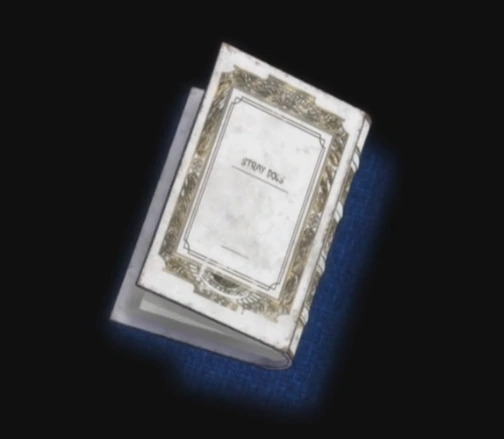
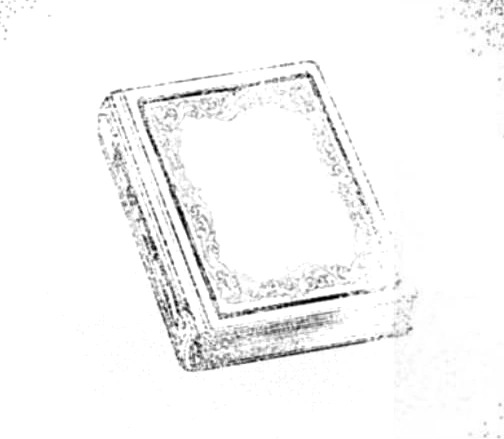
This is a long post, so I've bolded the key info. You can skim those if you don't want to go through everything. :)
***Major spoilers for BSD and for Beast!***
Main Series Information:
The first mentions of the Book occur in Chapter 28, when Fitzgerald tells Atsushi that the Guild's goal is to locate it. He tells Atsushi that only one copy of this book exists, and that neither flames nor abilities can damage it.
Fitzgerald claims he knows the Book is there because a prophet ability user foresaw that it had been sealed within Yokohama. When Atsushi asks what the relation is between him and the Book, Fitzgerald says that Atsushi is the guide to the Book.
In Chapter 35, Fitzgerald states that his goal is to use the Book to bring his daughter back to life.
The next mention is in Chapter 46, when Dazai talks to Fyodor in the alley. Dazai mentions that since Fyodor and the Rats don't have the firepower to burn down Yokohama, he instead needs to exterminate Yokohama's ability users to get to the Book, hence the cannibalism strategy.
Dazai says the true Book is a single novel with blank pages where anything written becomes the truth. Fyodor wishes to use it to make a world without the sin of ability users. Dazai says basically "good luck with that dude" lol. (Actually the line is "Give that a go, if you can, that is." which... might be significant?)
Chapter 58: Taneda dumps a lot of info on Ranpo. His assailant, who we know to be Sigma, stole a page from him, a single page removed from the Book in order to study it. The page has exactly the same capacity to make anything written become reality, it just has limited space to write. However, the Book has a restriction: it requires karmic/narrative consistency.
In Chapter 58.5, Mykola's speech about cages and the freedom of birds is ironically dictated word for word by a mysterious author. The translator note on the unofficial version I'm reading says the mysterious author is using imperfect Japanese with lots of katakana - I cannot confirm this myself, but it has interesting implications on our mystery author's identity if true. The page is used to position the Agency as the terrorists in the white hoods and frame them.
Chapter 59: Ranpo believes the Book was not made by an ability user but by something far greater than that. His proof is that unlike Mushitarou's ability, which can also alter reality, the people affected by the Book also have new memories to fit the alteration to the events. The Agency members remember committing the crime, even though they know they didn't.
In Chapter 70, Mushitarou reveals the DoA plans to use the other side of the page to eliminate the country at the next full moon. I am curious as to the significance of the full moon, given the moon's frequent recurrence in the series and Atsushi's ability connection to it. Chapter 74.5 establishes that the Sky Casino, with its 13 year history, was created 8 days ago when the page was written on, as a base for the next stage and also to "repay" Sigma for the use of his ability to retrieve it. In Chapter 75, Fyodor claims that Sigma, too, was written into existence via the Book 3 years ago - he has no memories before this point.
Chapter 77: the page was written with a condition that no police or law enforcement would believe in the Agency's innocence. However, Tachihara broke through that condition by reaffirming his identity as a member of the Mafia, which (metaphorically) tears the page.
Later references don't tell us too much more but I'll summarize them regardless. Kamui/Fukuchi has the page, which Atsushi knows from Sigma's info. Ranpo made an appeal to the police, explaining that the Agency was framed and the page preventing them from seeing the truth, and half the force sees the truth for themselves, breaking through the page's condition. Ranpo believed the direct opposition to the page's restrictions might sway Fukuchi into believing them (unfortunately, we don't know if this was right, as Fukuchi was not affected in the first place, being Kamui himself). And that's what we have so far.
Disturbing Implication #1: The Special Division knows/knew the location of the Book.
Taneda mentions that a page from the Book was taken to study. This implies that at one point, the Special Division had the Book or knew of its location. The higher ups may still know where it is. There are a few potential timelines here: the first is that the page was removed many, many years earlier, perhaps during the war, and the second is that the page was removed and tested 3 years ago, and Sigma resulted from these trials.
Disturbing Implication #2: Ranpo says the Book was created by something greater.
Something greater than ability users. I suspect this may be something outside their world. At this stage, it seems very likely this "greater entity" is an author - the author of the world we read about (it's Asagiri omg). An author, to the world they write, is akin to a god. I'm kind of joking about the Asagiri thing, but the "author" of the Book is likely someone/something that exists beyond the scope of the world of BSD.
Contradiction: The Book cannot be damaged by flame or ability, but pages can be torn out of it? How?
Beast Information:
Oh boy. Where to even start?
Beast Dazai states that the Book is the origin of the main universe's world, and it contains an infinite number of parallel worlds within it.
"What you write becomes a reality" is actually a misnomer. Writing in the Book calls a parallel world that aligns with what is written directly from the Book. This parallel world will then trade places with the real world.
There is a single physical reality, and infinite possible worlds. The Beast universe exists within the Book, as a possible world.
A version of the Book exists in the Beast universe. However, this Beast version of the Book is more of a weakness. Orders from the real world can overwrite Beast. And anyone who tries to write in Beast's Book will make Beast cease to exist.
Beast Dazai jumps at the end of Beast. This is because if more than 3 people know the truth about the Book, the world will destabilize - it may even disappear without Beast's Book being written in.
Beast Dazai created a singularity using his ability. It's not explained how he did this, but it has something to do with his nullification. He did this to read the memories of real-world/original Dazai - the Dazai who exists outside the Book. (It seems all but given that this is Dazai from the main timeline.)
Though the above conflicts with some of what we know in the main manga, we can take it as fact, I think. The narration is heavy on emphasizing that Beast Dazai is telling no lies in this scene.
Disturbing Implication #3: Any alterations are not inventions but transferrals, which means these events actually occurred in another universe.
This means that the Agency really were the DoA terrorists in a parallel world and they did carry out the plan. They really did take the hostages in this world. Tanizaki really did push the button. This would explain their memories. The caveat of no one in law enforcement believing them might make sense too - they're actually criminals in that world, so they would have no reason to believe them. "Trading places" also implies that the terrorist Agency universe has the terrorists trying to save the hostages like the Agency originally planned to do (potentially).
Sigma is an interesting case. If he really was written into existence from the Book, then he was called from another parallel world - literally displaced from his home. His amnesia likely occurred in that parallel world too.
Disturbing Implication #4: The parallel worlds are more fragile than the main world of BSD.
There is something different about our main universe. The Book that originates here is the real deal. But Beast's (and all the Books from different parallel worlds) leave them vulnerable. These worlds can be destroyed at any time if anyone tries to write in these Books. Only a select number of people can know how it really works before it starts to destabilize. What's more, at any point, someone could write in the real-world's Book and overwrite it entirely, and there would be nothing that any of the people within that world could do about it. And Beast Akutagawa, thinking back on the events of the story, comes to the conclusion that even though his world is "but a shadow", the desires, feelings and actions of the people within it make those people no less real than those in the original.
Beast is a goddamn existential horror.
Character Connections
Now, onto the characters who are known to have some kind of connection to the Book.

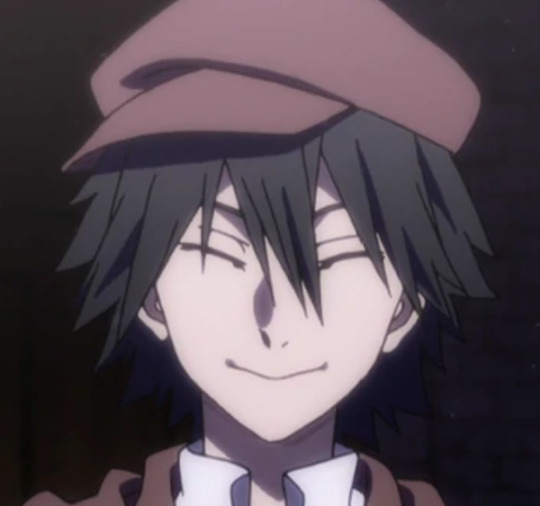

Fitzgerald wanted the Book in the Guild arc to bring back his daughter. While this is the first mention of it, given that he got his info from clearly secondhand sources (the prophet ability user or Fyodor, most likely), I don't think he has any sort of deeper understanding of it, nor a more personal connection. Ranpo seems to be figuring out the Book's logistics rather quickly, but I expect nothing less from the greatest detective, and he doesn't have a strong personal connection I can see as of yet. As for Fukuchi, whatever knowledge he gained 36 years ago might be connected... but again, I have nothing else to say on this front, considering we have little else on this (I'm actually more inclined to think it has to do with the war - which may tie in with the Book, but not necessarily). I would also be very surprised if Mori doesn't know something but I have no real evidence for this other than that the man is suspicious as hell. Then again, there's also Tokoyami Island, which "appeared" seemingly out of nowhere and is where Yosano's backstory took place and Fukuchi headed after his argument with Fukuzawa. It seems possible, if not likely, that it was created with the Book. So, let's go over some characters who we actually can expand on a little.
Taneda
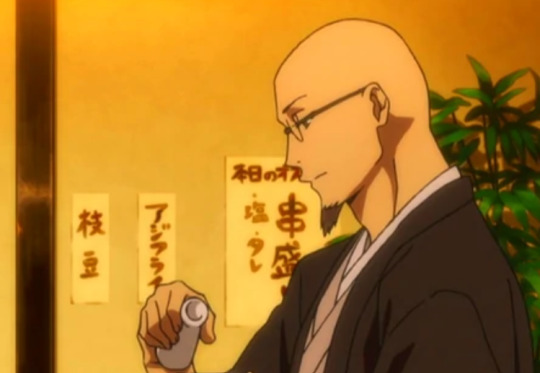
Not much to say here other than what kind of research was being done with the Book? Given that Taneda had the page on him, was he the one responsible for the research being conducted on it, or was he just involved?
What kind of research was being done with the page? How were they testing it? The page was blank, so they must not have created anything with it yet. How then, did Taneda know how it worked and that the page would have the same capacities as the full Book?
Taneda doesn't seem to understand the Book completely - he thinks it was created by an ability user, after all, and like everyone else in the main universe he doesn't know the reason the Book requires narrative consistency (that it is pulling from other worlds, not just making anything written come true).
The Special Division likely had the Book at one point, but by the time Fitzgerald comes to retrieve it, it has been "sealed". Did the Special Division seal it? Why and how?
Atsushi
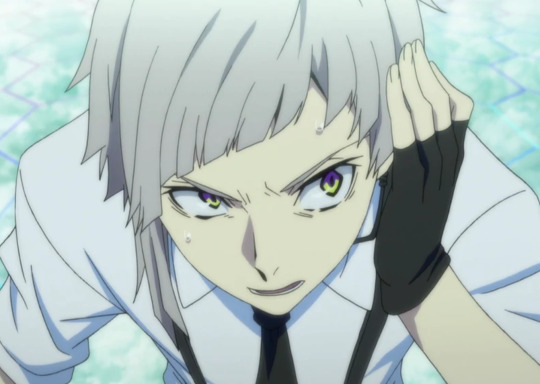
We know he has a lot to do with it. Atsushi and the Book are incredibly intertwined, and the initial conflict was kicked off by a bounty placed on his head for this connection.
He is called the "guide" to the Book. What does that mean? Is he meant to locate it? Unlock the seal? Or is he a guide on how to use it properly?
6 years ago, Shibusawa found Atsushi at the orphanage when he was just a kid and tortured him to extract his ability. He was a researcher who learned about the tiger from Fyodor, who called Atsushi's ability "one that guides the envy of all ability users". And we know Fyodor has been after the Book for a long time, so it's difficult to imagine this does not have something to do with it.
Atsushi is the only character to directly reference a real-life novel in the series and recall reading it. "The head may err but never the blood" and "I only regret what I haven't done" are from the real Nakajima Atsushi's "Light, Wind, and Dreams", a fictionalized autobiography detailing the last few years of the life of Robert Louis Stevenson. While other characters quote their namesakes' fiction on occasion, to my recollection, Atsushi is the only one who explicitly remembers reading the book, but finds himself unable to remember the author's name. Cute reference, or plot significant? You decide.
Atsushi's tiger is heavily associated with the moon, particularly the full moon. For some reason, the other side of the page is to be used at the next full moon and cannot be used sooner. Atsushi's ability crystal, pulled out of him by Shibusawa as a child, is described as "pale and glittering like the moon".
It is entirely unlike the red crystals that form in the Dead Apple separated abilities - including Atsushi's tiger (also red). It is, however, similar to Dazai's, which is white. Atsushi transforms into the tiger to swallow the moon-like crystal - to reiterate, it was outside him when he transformed. What's more, from Beast it's known that this instance was when his ability apparently activated for the first time - how could it do that if it was already removed from him? Later on, Shibusawa tries to take the crystal again and Atsushi's transformation deteriorates, that's true, but bear in mind that Atsushi was convinced that crystal was the tiger, which may have psychologically influenced this. In fact, the moon crystal may not be the tiger at all. It is entirely possible it is something else, and it is likely that which makes Atsushi so sought after. If it is, I refuse to believe this has nothing to do with the Book.
Atsushi's ability is described as the "spark of life that resists all abilities". A reference to his healing factor, perhaps? Or something more meaningful?
He's also referred to as an "angel" by Shibusawa who canonically got his information from Fyodor so... make of that what you will.
Tachihara
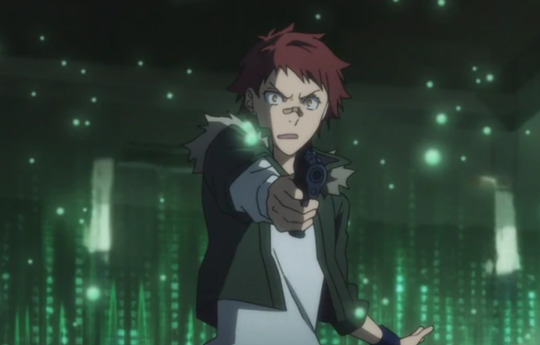
This isn't so much about Tachihara having significance in future but more about what his breaking of the page's conditions might mean.
At the crux of this is his split identity - he's a Hunting Dog, but also a mafioso, and his struggle between these identities is his core conflict in the Sky Casino arc.
Eventually, Tachihara, recalling Hirotsu and Gin's words that anyone in the Mafia knows that the Agency is innocent, frantically realizes they have the wrong culprits, thus breaking through the page's caveat that all law enforcement would never believe them, accompanied by a metaphorical tear in the page.
It's intriguing because we don't see this same dramatic depiction later on with the police when Ranpo appeals to them - Tachihara has changed his expected role from police to mafioso. Tachihara is no longer playing the "character" he was meant to play.
He tore out of that restriction in the story. His story line is now on a different path. There are some serious implications of that if a change in character can literally break people free of the Book's reality-altering influence. It is all-powerful so long as everyone plays their expected role in that narrative. Breaking out of that can change the story, even if only minutely.
Sigma

Of course Sigma is connected. He was apparently written into the Book three years ago - which means he came from one of the parallel worlds. (Provided Fyodor is telling the truth about his origins, but I think it would be very strange narratively if this wasn't - at least partially - true.)
I am curious if Sigma will regain some of his memories soon, or if it is even possible for him. If he can regain memories, then they would be from a world within the Book. Or, perhaps his memories don't exist because that world has been overwritten and no longer exists?
Is it possible for Sigma to communicate between worlds using his exchange of information? Maybe this is completely out of left field... I'm just curious what role Sigma is going to play in all this.
It's strange, for someone so obviously connected I... really don't have much to say about him. I just think we don't have enough.
Mykola
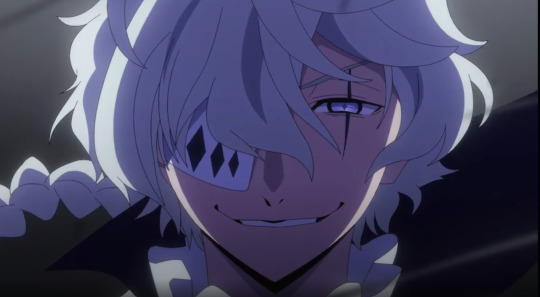
There isn't too much to say for certain about him, but I know I was super uncomfortable with his entire speech about birds and cages and freedom being dictated in real-time by the page. That's rough, buddy.
As of this moment, he's supposed to be dead, but somehow defied his fate and is still alive. He decided not to play the role ("character") he was previously meant to, and now he is the cast's biggest wildcard.
Mykola's fixation on freedom at all costs may have some interesting implications for his interactions with the idea of the Book. When his words were written on the page, was the page dictating his speech, or was it merely recording what he was already saying? If the Book is the story, then does the story control the characters, or, as it has been implied by Mykola and Tachihara, can the characters defy the story? When they defy the story, the story changes to accommodate this. Have they really, then, defied anything of significance at all? (For clarity: I don't know if this is where BSD will go with it - in actuality, I'm always confused when people theorize the Book's author is evil and controlling, or that the series will end tragically, given how much BSD loves to emphasize the importance of writing and reading and understanding and living. This is just an example of a few possible questions it may make sense for Mykola to fixate on.)
I don't have a lot to say for certain, but given his need to be free, his connection with Fyodor, and his Dazai-foiling traits, I'd think it very odd if he wasn't involved to some extent.
Dazai
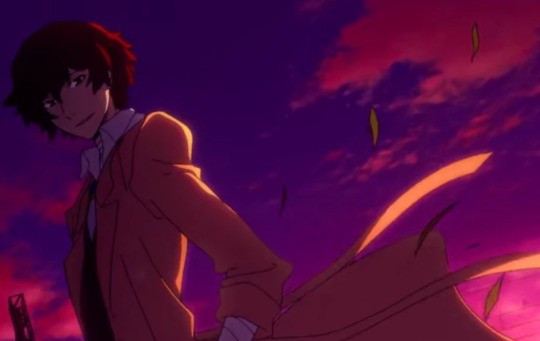
...where to even start.
Dazai clearly knows things about the Book. He appears to know much of what Fyodor does, and it makes me curious as to whether it came up when they first met (whenever that was).
However, main series Dazai doesn't seem to have all the info Beast Dazai does. For one thing, he too echoes that the Book makes all that is written into it become reality. He may know about the parallel worlds within it and could just be lying by omission, but I've seen very little to suggest that this is the case.
Main series Dazai appears to know about certain events long before they occur (not everything though; I need to remind people that he can and has been thrown off/wrong about things before) - notably, most of these planned events revolve around Fyodor. He's been preparing Atsushi and Akutagawa specifically to deal with the upcoming threat posed by Fyodor's pursuit of the Book.
Beast Dazai was somehow able to read the memories of real-world Dazai by creating a singularity with his ability... somehow. It's assumed he must've created it while in contact with the Book (otherwise how else could he have read the memories) but it's actually not elaborated on and we still have little to no details.
If his nullification caused a singularity, then how? Was it a singularity with the Book? Himself? Whatever the Book was sealed with/in? Singularities are still quite mysterious, but they need to involve one of two things - an insurmountable contradiction, or an uncontrollable increase in power with no way to cap it. Given that nullification doesn't lend itself to an increase in anything, it's likely an inherent contradiction.
I think it pretty obvious that Dazai has some special knowledge of the Book; some connection to it. He's been preparing to combat Fyodor for many, many years, and he seems to want to take Fyodor out as quickly as possible. Clearly, his potential use of the Book is a big deal to Dazai and worth putting his full effort into preventing, which is a little odd, honestly, considering he only met him once before the events of Dead Apple. Fyodor must've really made a terrible impression on him.
Where did he come from? There's that post about how Dazai is in everyone else's backstory for some reason, but we don't know his yet. Here's what we do know: He has some kind of connection with the Old Mafia Boss. He wandered around Yokohama for awhile. He's not related to Mori or an orphan he picked up.
While I've seen suggestions that Dazai met Fyodor in the 2 year gap between his leaving the Mafia and joining the ADA, I think there's reason to suggest he may have met Fyodor before he ever joined the Mafia, as a young child. Just bringing it up as a possibility because Beast Dazai's forming of a singularity with it sounded intentional - which means at 16, he would already have known what the Book was. Did he get his knowledge from Fyodor? Someone else?
Why did young Dazai become so listless and unable to find a reason to live? How did he become convinced that he will lose everything he wants so badly to keep when he gets it? Why did he think he could predict everything in advance? Is it just his intelligence and observation? Or is there more to it than that?
While I'm not a huge fan of the "Dazai is the Book" theory (given that it would make him literally inhuman, which I think runs antithetical to his story), on reviewing all this I've come up with a new incredibly deranged and not-at-all-sound theory:
Dazai is the Book's seal. In this essay I will -
Fyodor

First of all, we know hardly anything about him. We don't understand his ability. We don't even know how old he is. He's been with V/the Decay of the Angel for many years apparently... he was involved in Shibusawa's actions... he has some kind of a history with Dazai... he perfected the art of dramatically standing on windy roofs... truly, he's an enigma.
On a more serious note, all we know is that he wants the Book to create a world free of ability users. Free of sin.
This doesn't seem to fully align with Fukuchi's goal. My proof? They have differing concepts of "angels".
Fukuchi's "angels" borrow from the Buddhist concept of Devas and also likely references Mishima Yukio's The Decay of the Angel. Fukuchi tells Tachihara that the angels are the politicians who remain in their lofty seats and send soldiers into war to die. His goal isn't revenge per se, but it does appear to involve dethroning them in a sense. He doesn't mention wiping out ability users nor of having any particular ill-will towards them.
However, Fyodor's concept is closer to the Abrahamic concept of angel, what with the numerous references to original sin, the script for the play in Untold Origins speaking of angels banished by God for their sins, etc. What's interesting is that the play emphasizes ability users as "angels" who have regained some of their prior powers (I find it difficult to believe Fyodor was not involved in the creation of this) - so Fyodor's "sinful angels" are likely ability users. What does this mean for their goals? Are they still aligned? Is the undermining of government necessary for the elimination of ability users? (Also quick note: do not quote me on any religious stuff - I am not religious myself. I do research sometimes but I'm very, very far from an expert ahaha.)
So, now: Cannibalism was part 1 of the DoA's plan, and all the ensuing stages will culminate in the use of the other side of the page.
Firstly, there's the obvious "what will the other side of the page be used for?"
But then there's something else. By the time Cannibalism occurred, the pieces were already in place for the next phase of the plan, where Sigma would steal the page from Taneda. Why then, does Fyodor still claim, on numerous occasions, to be after the Book? The page should be able to accomplish anything the Book can. Either there is something misleading in the information we have been told, or there is something he wants to do with the Book that isn't writing in it. I think the former is more likely but I digress, the latter is still a possibility.
A few more outstanding questions: Why was he spreading info on Atsushi to Shibusawa and presumably Fitzgerald, but not going after Atsushi himself? Wouldn't he want Atsushi as the Book's guide?
What is his connection to the prophet ability user Fitzgerald mentioned - is it him, with his uncanny predictive powers? Is it someone else associated with the DoA? Is it someone in the government? How long ago was this prediction made - was it made long enough ago that this is why V was active in Yokohama?
There's a lot that's very confusing about Fyodor, and I don't think we know nearly enough about him to make proper predictions as to his relation to the Book yet.
Akutagawa
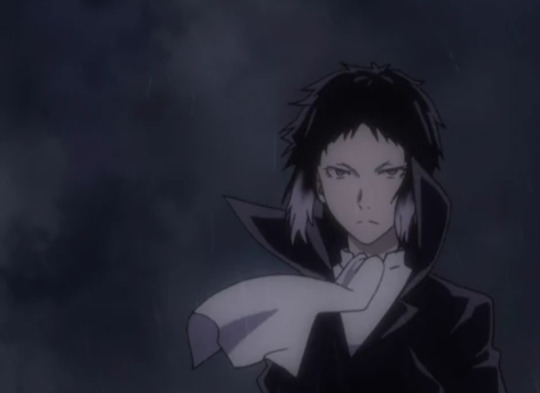
He's only really tangentially related to it through his connection to Atsushi - if any showdown is going to happen involving the Book, you can bet he and Akutagawa will be teaming up for that.
At the same time, Dazai selected Akutagawa as a mentee a long time ago, and he's been planning for them to work together since he met Atsushi, specifically so they can prevent Fyodor from achieving his goals. In Beast, he mentions their abilities form a singularity together - likely that ability to "cut through anything".
I know this may be entirely wild and out of left field but if it can cut through anything... could it damage the impervious Book? Could it even destroy it? Or maybe it could destroy whatever is sealing it? Who knows, but it makes me think they're going to have to destroy something. (Interesting how this runs counter to sskk's need to act as protectors of the Book in Beast... so maybe it will be in defense. It's all so unclear.)
There's also the whole "dragon is the manifestation of the chaos of ability users". Atsushi and Akutagawa are the tiger and the dragon, at odds with each other via rivalry but also in balance. I think it would be very strange if Atsushi's ability were unusual but not Akutagawa's.
In addition to all the above, I am also side-eyeing all the author characters in this series. For one thing, there's very few of them. For another, two of them have died, changing the path of their respective best friends' lives - and in a series that actually... doesn't kill that many named characters off permanently, it's worth taking a look at.

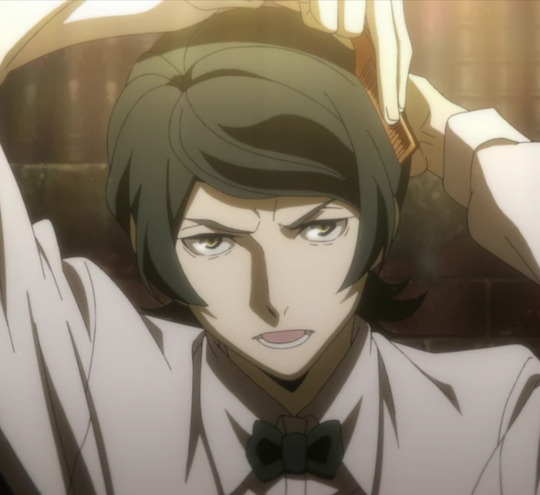
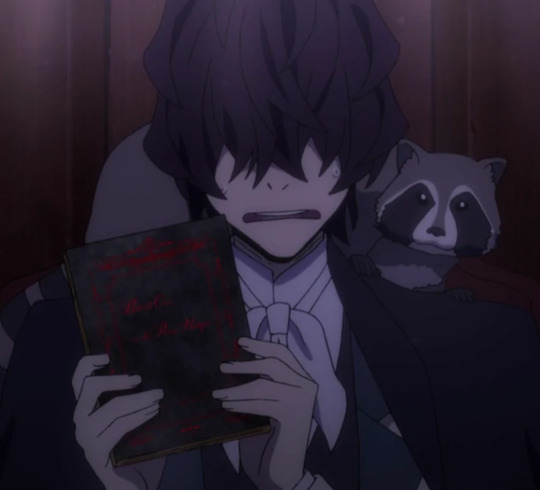
Yokomizo wanted to transcend the boundaries of fiction in his writing to create a mystery that bled into reality - the ultimate mystery. Mushitarou writes to see his friend again, to connect with him through his greatest passion. Poe's ability allows him to take real people and pull them into constructed narratives that can be escaped once they are "solved" - when the story reaches its conclusion. He is also the one who spurs Mushitarou into writing to cope with his loss.
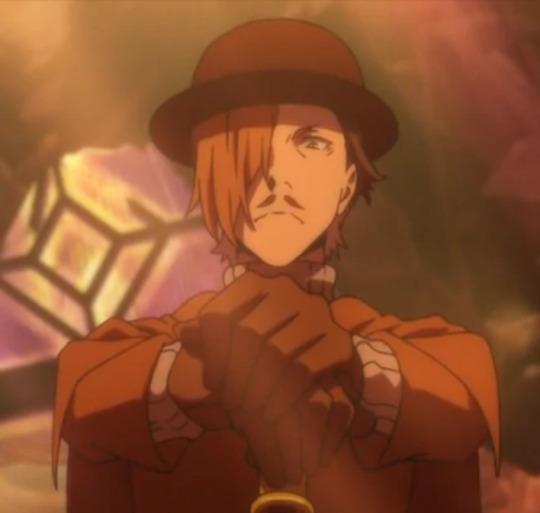
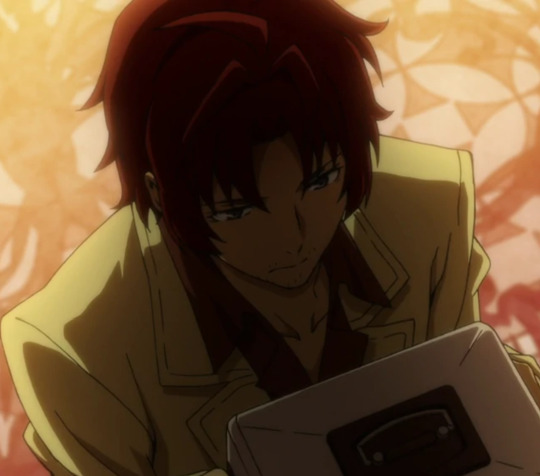
Natsume wrote a few books as well. We don't know completely what they were about (and from my brief research they don't seem to correspond perfectly to his real life novels - might be a reference to Kokoro but the story does not appear to be the same...), but at least one was a series of three novels, with the last featuring an assassin who stopped killing, but Natsume derided these books and said they were not very good. He tore out the last few pages from the third, final book that explained why the assassin changed his path, and gave the book to a young Odasaku with a note "Don't blame me if you regret [reading] it".
Odasaku wanted to complete that novel. It completely changed his perspective on the world and opened his eyes - he re-read it multiple times (if I remember correctly, he also read it over and over to a wounded and exasperated Dazai in TDIPUD lol), and the lack of an ending bothered him immensely, not just because the story was incomplete, but because the scene was necessary to understanding the assassin's character. Odasaku wrote to understand himself and others, because writing novels is writing people. Natsume seemed to think he was uniquely qualified to do so, but Odasaku disagreed, thinking that someone who took lives was in no position to write about them - to understand them.
Odasaku dies. In every universe, and before he gets the chance to write the novel that sits in his mind - except in Beast, where Dazai painstakingly maintained the world to ensure he stayed alive. It seems oddly specific that this one random person should die before having the opportunity to write the story he wished... and I have to wonder if the universe really doesn't want him writing that book for some reason. And if that's the case, then is there any reason (beyond saving Oda from killing) why Natsume encouraged him to do so?
As a bonus, in the anime, Odasaku is the one to title drop "to the stray dogs" as a cheers, which Dazai will later echo. This doesn't happen in the novel... but if you look back at the difference between the anime Book and the manga Book - you'll notice the manga Book's cover is blank. The anime's says "Stray Dogs". Could be something, could be nothing. But it's worth mentioning.
And that's pretty much it for now! As we get more info, I'll continue to update this post. If anything here gives you ideas, please feel free to ramble about it in the tags or comments, or shoot me an ask! I love to read all your thoughts. :)
#this is so long. if you made it through... congratulations! you are probably just as obsessed as i am hgnkvhgvnskf#feel free to add on. these aren't full theories or anything and a lot are just suggestions or open ended questions#i hope this is a helpful reference and at least sparks some interesting thoughts!#bsd#bsd meta#bsd the book#i don't want to tag everyone...#so i won't lol#storyrambles
1K notes
·
View notes
Text
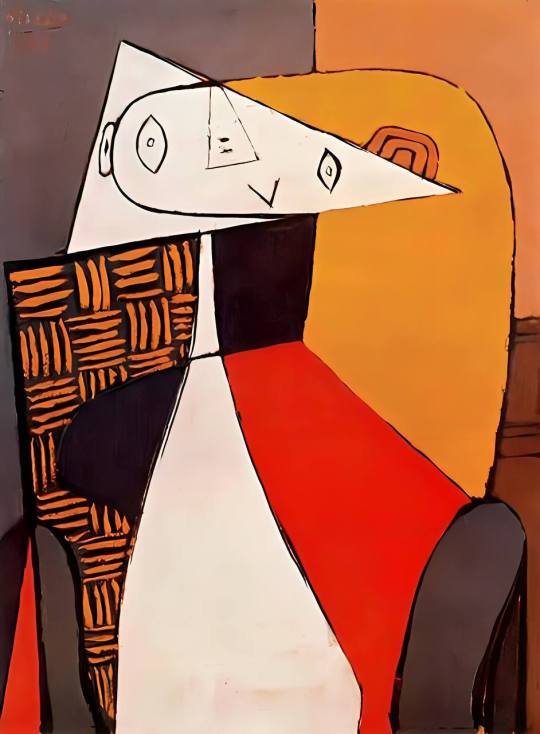
Head of a Woman by Pablo Picasso (1939), Private Collection
Psychology of Fragmentation and Identity
Picasso's Head of a Woman captures a sense of fragmented identity, where the geometric shapes and disjointed lines represent the splintering of the self. The figure's abstracted face evokes an internal conflict—a psychological tension between different aspects of one’s personality that refuse to seamlessly integrate. This disconnection speaks to the unconscious struggle many leaders and professionals experience, where their public persona and private self remain at odds. In the corporate world, this could manifest as a leader who projects strength and control outwardly, while internally grappling with insecurities, doubts, or emotional divides.
For executives or professionals who resonate with this painting, the fragmentation can represent the emotional cost of leadership. The pressure to maintain authority and decision-making often forces them to compartmentalize, dividing aspects of their personality to fit into their leadership role. This splintered self creates a tension that prevents them from experiencing a true sense of wholeness, a theme powerfully conveyed by the sharp, disjointed elements of the portrait.
Ambition, Control, and Societal Pressure
The bright colors and exaggerated features highlight a dynamic between control and societal expectations. The bold reds and yellows suggest ambition and energy, but the abstract nature of the figure implies that this energy is scattered or unfocused. Much like a leader managing a vast array of responsibilities, the figure appears to be pulled in multiple directions, unable to find a singular, cohesive focus. This evokes the unconscious pressure professionals face to meet both their own ambitious goals and the external demands placed upon them by stakeholders, markets, or regulatory bodies.
In a business context, this painting might speak to the overwhelm of leadership, where the constant navigation between personal desires and societal expectations leads to a fractured approach. The geometric shapes can be interpreted as barriers—the hard edges between ambition, control, and external validation—each one creating a sharp distinction that fragments the leader��s path forward. It reveals the emotional toll that striving for success, while maintaining a public image, can take on an individual.
The Unconscious Desire for Wholeness and Authority
Despite the fragmented nature of the figure, there is an underlying desire for wholeness. The painting reflects a leader’s unconscious drive to reconcile the divided aspects of their identity—personal and professional, emotional and rational—in an attempt to achieve a sense of completion. However, the painting also suggests that this wholeness is elusive, as the abstract lines prevent the figure from fully coming together.
For a professional or executive drawn to this work, it symbolizes the constant pursuit of external validation, authority, and success, but also the inherent emotional fragmentation that results from this pursuit. The figure’s disjointed form represents the internal conflict leaders face when trying to balance their need for control with their desire for emotional connection and fulfillment. In this context, the painting becomes a metaphor for the psychological cost of leadership—the persistent drive for achievement, while sacrificing inner cohesion.
Leadership and the Tension Between Public Persona and Private Self
This painting speaks to a leader’s internal conflict, where their public image and personal emotions are constantly at odds. The figure’s geometric face could symbolize the mask of authority a leader wears in their professional life, while the abstraction represents the emotional complexity that remains hidden beneath. The sharp angles and disconnected features convey the tension of maintaining a composed, authoritative persona while experiencing emotional fragmentation internally.
For a collector or executive, this painting serves as a visual representation of the psychological pressures of leadership. It reflects the need to project strength and control, but also acknowledges the emotional sacrifices that come with such a position. The painting becomes a reminder that, while external success and validation are important, they can often come at the cost of personal emotional wholeness.
#pablo picasso#artwork#modern art#art#art history#psychoanalysis#contemporary art#aesthetic#cubism#art collectors#art collection#artinspiration#art inspo#art gallery#symbolism#fine art#women#infantilism#painting
43 notes
·
View notes